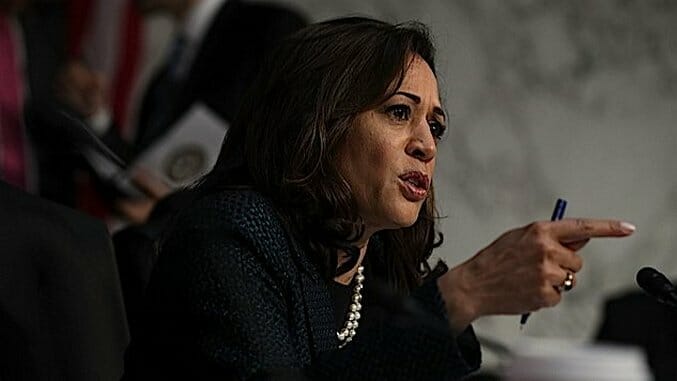135,613 Reasons Kamala Harris Will Not Be President in 2020
Photo by Alex Wong/Getty
Last week, freshman Senator Kamala Harris (D-CA) announced that she would co-sponsor Senator Bernie Sanders’ highly anticipated Medicare-for-all legislation, declaring it “just the right thing to do.”
I intend to co-sponsor the Medicare for All bill because it’s just the right thing to do.
— Kamala Harris (@KamalaHarris) August 30, 2017
Buzz has surrounded the former California Attorney General ever since she defeated fellow Democrat Loretta Sanchez to become the first ever Indian-American to reach the Senate. Top that achievement off with well-delivered platitudes about pragmatic resistance to President Donald Trump’s agenda, and the conditions are ripe for a cult of personality.
But Democrats would do well to avoid what is sure to be a disaster, should Harris decide to run. Already her name inspires rumblings of dissatisfaction from the progressive wing of the party, which does not bode well considering what it meant for Hillary Clinton and Jon Ossoff.
Harris’ biggest problem is that she is seen as a corporate Democrat. That image probably has something to do with the large sums of industry money she accepted last election.
According to Maplight, which describes itself as “a nonpartisan, 501©(3) nonprofit organization that reveals the influence of money in politics, informs and empowers voters, and advances reforms that promote a more responsive democracy,” in the 2016 election cycle, Harris received $41,900 from telecommunications companies (calculated by adding “telecom services” and “telephone utilities), $26,783 from commercial banks, and a whopping $626,869 from securities and investment interests. She even took $12,991 from oil and gas!
Fans of the freshman California Senator have been quick to point out that she has taken some genuinely progressive positions. Medicare-for-all isn’t the only bill of Sen. Sanders’ which she has co-sponsored. She also joined him on legislation to make public colleges and universities tuition free.
Others have also pointed out that the donation figures represent donations from individuals within each industry as opposed to the companies themselves.
However, the Senator’s corporate ties are real.
Harris has attended multiple fundraisers hosted by lobbyists, during and after the election, including one last month in the Hamptons. All told, during the 2016 election cycle, lobbyists donated $135,613 to her campaign. Those donations came from individuals representing a plethora of corporate interests—from big pharmaceutical companies and Wall Street banks to health care companies and telecommunications giants.
-

-

-

-

-

-

-

-

-

-

-

-

-

-

-

-

-

-

-

-

-

-

-

-

-

-

-

-

-

-

-

-

-

-

-

-

-

-

-

-








































